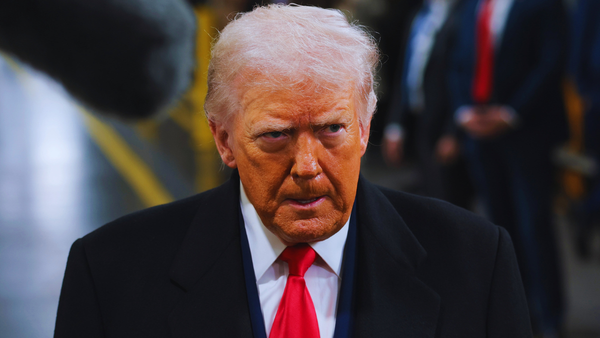Economy and Society is Ballotpedia’s weekly review of the developments in corporate activism; corporate political engagement; and the Environmental, Social, and Corporate Governance (ESG) trends and events that characterize the growing intersection between business and politics.
ESG Developments This Week
In Washington, D.C.
NYC papers squabble over ESG and its opponents
On August 5, the New York Times ran an investigative report on the people and organizations that it argues are, in its words, weaponizing public office to push back against ESG:
“Nearly two dozen Republican state treasurers around the country are working to thwart climate action on state and federal levels, fighting regulations that would make clear the economic risks posed by a warming world, lobbying against climate-minded nominees to key federal posts and using the tax dollars they control to punish companies that want to reduce greenhouse gas emissions.
Over the past year, treasurers in nearly half the United States have been coordinating tactics and talking points, meeting in private and cheering each other in public as part of a well-funded campaign to protect the fossil fuel companies that bolster their local economies.
Last week, Riley Moore, the treasurer of West Virginia, announced that several major banks — including Goldman Sachs, JPMorgan and Wells Fargo — would be barred from government contracts with his state because they are reducing their investments in coal, the dirtiest fossil fuel.
Mr. Moore and the treasurers of Louisiana and Arkansas have pulled more than $700 million out of BlackRock, the world’s largest investment manager, over objections that the firm is too focused on environmental issues. At the same time, the treasurers of Utah and Idaho are pressuring the private sector to drop climate action and other causes they label as “woke.”
And treasurers from Pennsylvania, Arizona and Oklahoma joined a larger campaign to thwart the nominations of federal regulators who wanted to require that banks, funds and companies disclose the financial risks posed by a warming planet.
At the nexus of these efforts is the State Financial Officers Foundation, a little-known nonprofit organization based in Shawnee, Kan., that once focused on cybersecurity, borrowing costs and managing debt loads, among other routine issues.
The New York Times reviewed thousands of pages of internal emails and documents obtained through public records requests by Documented, a watchdog group, that shed light on the treasurers’ efforts since January 2021.
At conferences, on weekly calls, and with a steady stream of emails, the foundation hosted representatives from the oil industry and funneled research and talking points from conservative groups to the state treasurers, who have channeled the private groups’ goals into public policy.
The Heritage Foundation, the Heartland Institute and the American Petroleum Institute are among the conservative groups with ties to the fossil fuel industry that have been working with the State Financial Officers Foundation and the treasurers to shape their national strategy.
Many Democratic state treasurers support efforts to combat climate change and want banks and investment firms to be clear about risks posed to returns for retirees and others. Democratic lawmakers in California and New Jersey are working on legislation that would require their state pension systems to divest from fossil fuels. But Democrats have not mounted anything like the national campaign being orchestrated by the State Financial Officers Foundation.”
On August 7, the New York Post responded with an editorial critiquing its crosstown rival, declaring that “The New York Times’ cluelessness just hit an astounding new high”:
“Whoof, that was some truly deranged reporting by The New York Times the other day on “How Republicans Are ‘Weaponizing’ Public Office Against Climate Action,” painting an evil conspiracy of Republican state treasurers “to use government muscle and public funds to punish companies trying to reduce greenhouse gases.”
Yes, a bunch of GOP officials are fighting back against the progressive drive “to use government muscle and public funds” to destroy carbon-based fuel industries — and against banks and investment firms that are using their power to the same end. And the Republicans are working with think tanks, nonprofits and so on in this effort.
Exactly as Democrats have long been doing on their side. Just for starters, the New York city and state comptrollers boast of their anti-carbon strategies for investing huge pension funds, as do other Dems in similar jobs across the nation.
Heck, Mike Bloomberg has been sending millions to state Attorney General offices to fund special units to sue oil, gas and coal companies. That’s far more of an offense against good government than anything the Times uncovered.
Lefties generally think it’s awesome when they leverage government power to their ends, whether it’s dubious anti-carbon use of pension funds etc. or all those silly “state travel bans” that have taken off in recent years, mostly targeting other states whose school trans-bathroom policies don’t toe the progressive line.”
Missouri Attorney General Schmitt launches investigation of Morningstar over ESG business practices
Even as the New York Times highlights state treasurers pushing back against ESG, other state officials – not connected to the treasurers’ offices – are also pushing back. Missouri Attorney General Eric Schmitt, for example, has launched an investigation of Morningstar for its ESG business practices:
“Missouri Attorney General Eric Schmitt has launched an investigation into whether Morningstar Inc (MORN.O) violated a state consumer-protection law through its evaluations of environmental, social and governance (ESG) issues, his office told Reuters.
The review is two-pronged, covering ESG matters as well as whether the financial research firm violated a separate Missouri law aimed at protecting Israel from a campaign to isolate the Jewish state over its treatment of Palestinians.
Staff for Schmitt said it is the first instance of a state looking into ESG ratings products potentially breaching such laws, on the books in more than 30 U.S. states….
In a pair of July 26 civil investigative demands to Morningstar and to its Sustainalytics ESG-ratings unit, Schmitt said they may have violated the Missouri Merchandising Practices Act such as by misrepresenting or omitting facts.
Schmitt’s office said the violations may have occurred through the sale of ESG products to Missouri-based businesses and other consumers, such as if the products overly emphasized the risk for companies of doing business in Israel.
Among his demands, Schmitt is seeking documents or communications relating to “ESG Services and BDS,” referring to efforts to boycott, divest or sanction the Jewish state or companies there.”
Morningstar is not the only investigative target of Schmitt’s office. The state of Missouri – along with several other states – is also investigating BlackRock, Inc., the world’s largest asset management firm and one of the most visible advocates of ESG and sustainability:
“Missouri Attorney General (AG) Eric Schmidt and 18 other Republican AGs are investigating BlackRock concerning the company’s push to place environmental, social and corporate governance (ESG) standards on states’ pension funds, according to the AGs’ letter.
The Republican AGs, including those from Arizona, Texas, Ohio and Montana, sent a letter to BlackRock CEO Larry Fink on Thursday claiming that BlackRock did not attempt to make money for states’ pensioners, but rather used funds to pressure companies to phase-out fossil fuels and comply with its climate agenda. The AGs allege that numerous of the firms’ actions ‘may violate multiple state laws’ as BlackRock may have an ulterior motive, particularly concerning its “climate agenda,” that differs from its public stances and statements.
“They’re dancing on the precipice of being in breach of their fiduciary obligations…and that’s where you’d run into law-breaking in a state like Montana,” Montana AG Austin Knudsen told the Daily Caller News Foundation.
“BlackRock’s past public commitments indicate that it has used citizens’ assets to pressure companies to comply with international agreements such as the Paris Agreement that force the phase-out of fossil fuels, increase energy prices, drive inflation, and weaken the national security of the United States,” the letter said….
AGs are scrutinizing BlackRock’s assertions that it posits a neutral stance on energy investments and merely offers its clients as many investment options as possible, according to the letter. The supposed neutrality is contradictory to the company’s public commitments to stopping climate change.”
On Wall Street and in the private sector
Is ESG “Losing its Mojo?”
In his newsletter for Bloomberg, Javier Blas, a columnist and former reporter for Bloomberg and a former editor at The Financial Times, argues that for many in the financial industry, “ESG is So, So, So Yesterday.” In the August 5, edition of “Elements” – the newswire’s new energy and commodities letter – Blas writes:
“Few companies have been as toxic as Glencore Plc for hard-core ESG investors. The Swiss-based commodity giant is the world’s largest exporter of coal, the biggest contributor to climate change.
For years, Glencore was on the defensive, with shareholders and analysts questioning its plan to close coal mines gradually rather than spin them off or sell them, as many competitors did.
Until now.
“The world seems to be short of energy,” one sell-side analyst told Glencore Chief Executive Officer Gary Nagle after the company reported record half-year results Thursday. “How do you think about your plans to shrink the output of the coal business? What would it take for you to delay the ramp down and, ultimately, make investments to give the world the energy it needs in the short term?
For months, it has been clear that the ESG boom was in retreat. The question at Glencore’s conference call highlights by how much.
In energy and commodities, ESG has gone from hottest item to démodé in about two years. Or as one major European institutional investor put it to me recently: “ESG is so, so, so yesterday.”
Even BlackRock Inc., an early evangelist of the movement, called for time earlier this year, warning that pushing companies to meet climate-change targets needed to take into consideration the “current geo-political context, energy market pressures, and the implications of both for inflation.””
ESG hits a wall in China
ESG funds in the United States and Europe have been struggling over the past couple of quarters, with energy stocks soaring and tech stocks sagging, which has caused American investors to pull funds out of the sector at an unprecedented pace. This week, The Financial Times notes that this phenomenon is not restricted to the United States and that ESG is also struggling to attract and keep investors in Asia, particularly in China:
“Chinese funds focused on environmental, social and governance recorded net outflows of $1.4bn in the second quarter, marking an even sharper slowdown than sustainable funds elsewhere in the region.
ESG funds in the Asia-Pacific region, excluding Japan and China, suffered a second consecutive quarterly decline in net inflows, attracting just $929mn during April to June, down from $1.27bn in the first quarter, Morningstar noted in its latest sustainable funds report.
Taiwan raked in the most net inflows for the quarter at $91mn, while Hong Kong had $129mn. South Korea, India and Indonesia had the biggest net outflows apart from China in the second quarter among regional markets.
Figures for China, which were only available after the publication of the report, showed net outflows of $1.4bn in the second quarter were a dramatic turnround from the $208mn in net inflows that the country had in the first quarter….
Europe, with inflows of $307bn, accounted for 94 per cent of total global net flows for the second quarter, but this was still a 57 per cent drop from $71.7bn in the first quarter….
“Amid investor concerns over a global recession, inflationary pressures, rising interest rates and the conflict in Ukraine, sustainable funds net inflows plummeted in the second quarter, [but] fared better than the broader market,” said Hortense Bioy, Morningstar’s global director of sustainability research.”
Learn More






